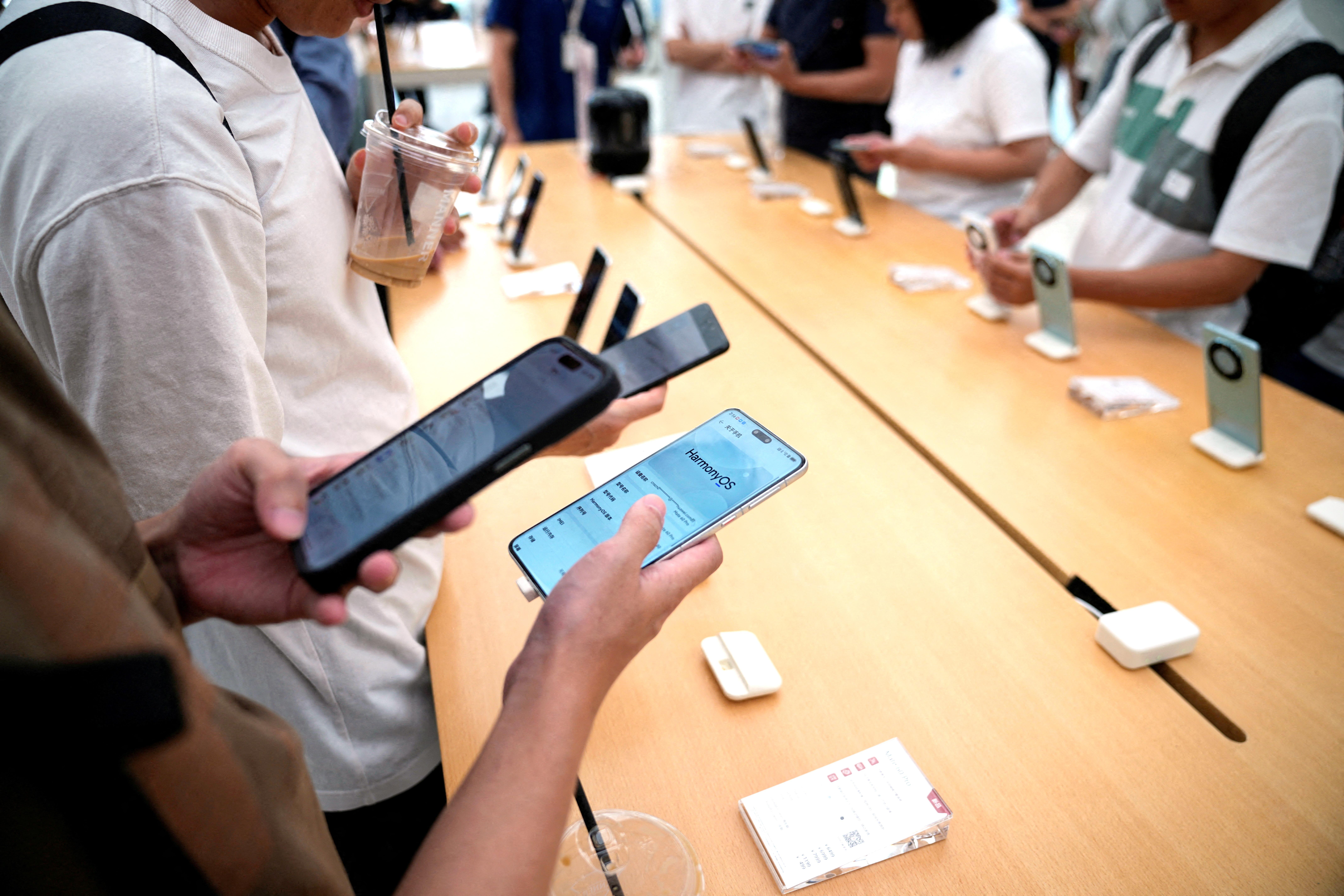 People explore the features of Huawei Mate 60 Pro smartphone at a Huawei store in Shanghai on Friday. (PHOTO / REUTERS)
People explore the features of Huawei Mate 60 Pro smartphone at a Huawei store in Shanghai on Friday. (PHOTO / REUTERS)
Huawei Technologies is a front-runner again in the smartphone market with a new phone powered by an advanced chip despite sweeping US sanctions, which may have a ripple effect on both Chinese and US semiconductor industries, experts say.
The new handset, Mate 60 Pro, uses a 5G application processor which represents "a made-in-China design and manufacturing milestone", according to a teardown by a team from industry research company TechInsights.
The team believes the 7-nanometer processor was manufactured by China's leading chip foundry, Semiconductor Manufacturing International Corporation, or SMIC.
The new phone's self-developed 5G chipset, the operating system HarmonyOS, and other technical differences from its competitors, show that "Huawei is back after three years in the wilderness", said George Koo, a retired international business adviser in Silicon Valley
It "demonstrates the technical progress China's semiconductor industry has been able to make without EUV (extreme-ultraviolet) lithography tools," said Dan Hutcheson, vice-chair of TechInsights. "The difficulty of this achievement also shows the resilience of the country's chip technological ability."
ALSO READ: Huawei smartphone thumbs nose at US sanctions
The most cutting-edge EUV machines are used to manufacture advanced chips. SMIC has no access to EUV machines because of US export controls. Industry experts said it could use some older equipment to make advanced chips.
Huawei has been on the United States Commerce Department's Entity List, which restricts its access to US technologies, since May 2019.
The new phone's self-developed 5G chipset, the operating system HarmonyOS, and other technical differences from its competitors, show that "Huawei is back after three years in the wilderness", said George Koo, a retired international business adviser in Silicon Valley.
Huawei has not disclosed how it has achieved the necessary technological advances. Koo believes the achievement would not be possible without partners in China and a domestic supply chain, from design software and semiconductor fabrication to essential chemicals and materials.
What Huawei accomplished will ripple through China's semiconductor industry, Koo said. "Huawei's experience will facilitate and encourage others to follow. China's self-sufficiency in semiconductors will only increase."
Tech breakthroughs
Huawei's technological advances have prompted some US lawmakers to call for tougher restrictions. Wisconsin Republican Representative Mike Gallagher, chairman of the House Select Committee on Competition with China, suggested the US should end all its exports to both Huawei and SMIC — even those involving older technologies that are currently allowed under the law.
California-based chip developer Qualcomm was able to obtain export licenses from the government to provide Huawei with older generation 4G chips.
China accounts for roughly two-thirds of Qualcomm's revenue. Qualcomm's stock plunged 7.2 percent to $106.40 on Thursday on the latest news, alongside shares of other cellphone suppliers, Bloomberg reported.
"America's shortsighted strategy to decouple from China will devastate the revenue of leading US providers of advanced chips such as Nvidia and Qualcomm and manufacturers of chipmaking equipment such as Applied Materials and Lam Research," said Koo.
READ MORE: Huawei celebrates over 100m Mate series phones sold
"These companies will see their comparative advantages dry up. In the near term, they are not allowed to sell to China. In the long term, China will not need to buy from them."
The technological breakthrough was expected to help Huawei in its home market, especially in competition against Apple, according to Bank of America Securities.
"If Huawei has the capability to supply and scale its homegrown Kirin 9000S (chip), we see the Mate series phone as an opportunity for Huawei to increase its shipments and regain its market share, potentially posing downside risk to iPhone sales, especially in the Asia-Pacific," analysts at BofA Securities wrote in a research note last week.
People explore the features of H


